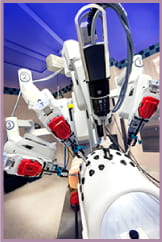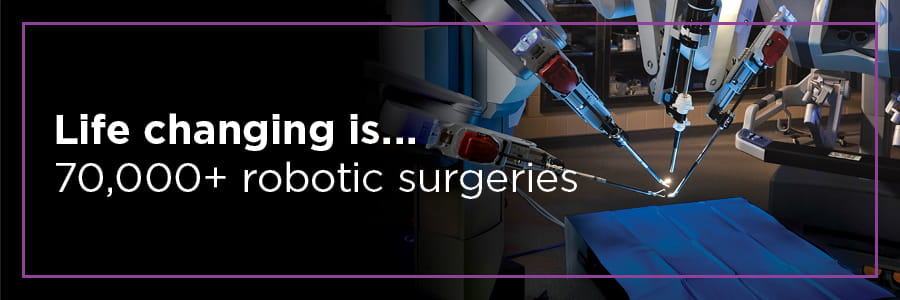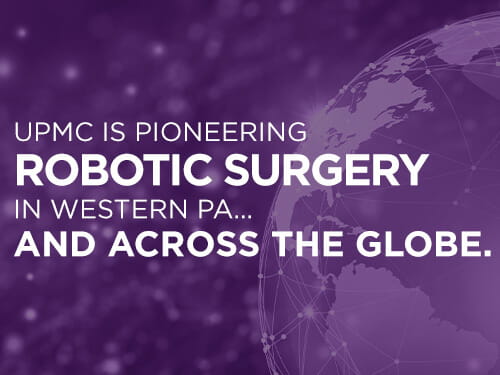Robotic Surgery Highlights Include:
- More than 70,000 advanced robotic surgical procedures at UPMC since program inception.
- Among the most experienced in the world in robotic-assisted pancreatic resections.
- Leader in Transoral Robotic Surgery (TORS) for throat tumors, allowing the surgeon to operate through the mouth to reach the tumors.
Benefits of Robotic Surgery May Include:
- Minimally invasive robotically assisted procedures
- Smaller incisions
- Less scarring
- Reduced pain
- Ability to operate on hard-to-reach areas of the body, such as the throat
- Ability to perform complex procedures with improved visualization and dexterity

The da Vinci Surgical System® for Robotically Assisted Surgery at UPMC
UPMC has one of the largest da Vinci surgical robot programs in North America. Dual consoles allow a team of surgeons to operate simultaneously and to foster a truly comprehensive and collaborative approach to surgical care.
The da Vinci Surgical System® features a 3D image-processing system, interactive mechanical arms with joints that follow movements of the surgeon's hands, and a camera arm that allows the surgeon to see a high-definition, magnified view of the procedure. In some cases, robotically assisted surgery allows our surgeons to perform surgery on tumors that are otherwise inoperable.
Robotic Surgery Treatment Center Locations
More than 20 UPMC hospitals have active robotic surgery programs:
Specialty Advanced Robotic Services at UPMC
Robotic Cardiac Surgery
The use of robotic cardiac surgery at UPMC allows cardiac surgeons to perform intricate procedures, including mitral valve repair, aortic valve replacement, and coronary bypass grafts, in a minimally invasive manner, typically leading to a generally easier and faster recovery for the patient.
Head & Neck Tumors & Lesions
At the UPMC Center for Robotic Head and Neck Surgery, our surgeons and experts are national and world leaders who develop new techniques using assistive robots to access hard-to-reach head and neck tumors. Many tumors can now be reached through the natural opening of the mouth using a technique called Transoral Robotic Surgery (TORS), eliminating the need for external incisions through the face and jaw.
Thyroid Robotic Surgery
At the UPMC Center for Robotic Head and Neck Surgery, our experts perform robotic thyroid surgery, which avoids a visible incision.
Esophageal, Lung, and Thoracic Mediastinal Robotic Surgery
Our experts in Robotic Thoracic Surgery treat esophageal cancer, lung cancer, thymus and other mediastinal (middle chest) tumors, Myasthenia Gravis, gastroesophageal reflux disease (GERD), paraesophageal and hiatal hernia, Achalasia, and other thoracic chest diseases using minimally advanced invasive robotic surgery.
Robotic Surgery for Liver, Pancreas, and Gallbladder
UPMC is one of the world's most experienced centers for robotic Whipple surgery for pancreatic cancer. Our team also has expertise in robotically assistive surgery for liver cancer, bile duct cancers and gallbladder disease.
Robotic Surgery Options for Bariatric (Weight Loss) Surgery
Our bariatric surgeons use robotic surgery to perform several standard surgical procedures, including gastric bypass, gastric sleeve, and gastric band surgery.
Robotic Kidney and Adrenal Surgery
UPMC urologists use robotic technology to perform complex kidney and adrenal surgery such as partial nephrectomy, often allowing the tumor to be removed while sparing kidney function.
Colon and Rectal Robotic Surgery
Robotic surgery may be utilized for colon cancer, rectal cancer, Inflammatory Bowel Disease (IBD), and other conditions that require complex surgery.
Robotic Prostate and Pelvic Surgery
At UPMC, robotic surgery has become a standard technique of urological surgery for conditions including prostate cancer and a variety of other pelvic disorders.
Gynecological Robotic Surgery
UPMC's gynecological surgeons have vast experience in applying robotic surgery to a number of gynecological conditions. Specialties include general gynecological surgery, gynecological cancer, reproductive endocrinology and infertility, and uro-gynecology.
UPMC Center for Advanced Robotics Training: Teaching Other Surgeons
UPMC's robotic surgery experts have developed techniques that are sought out by surgeons from across the U.S. and around the world. Surgeons travel to UPMC in Pittsburgh to learn robotic surgery techniques from our experts through the UPMC Center for Advanced Robotics Training. In addition, our surgeons frequently teach robotic surgery courses in Europe and Asia.



















